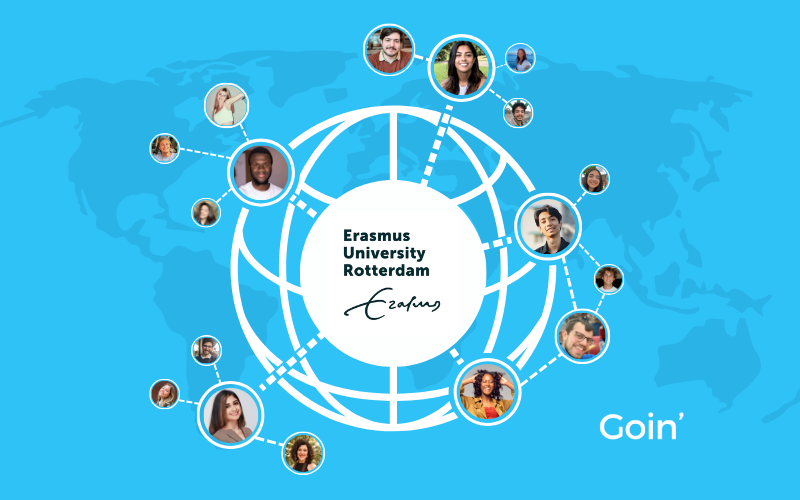Realization: Connection Starts Before Arrival
Karen and her team understood that orientation shouldn't begin after students land, it should begin when they open their admission letter. By integrating Goin' into their pre-departure journey, they made peer connection the first step, not the last.
"We like to provide our students with a soft landing," Karen explained. "We take care of them really well once they get on campus, and we wanted to make sure they already knew each other before arriving. Goin’ is perfect for that."
"Now our students already get together before actually arriving on campus," Karen said. "And they do it online. It’s a really wonderful community."
A student heading to Erasmus University makes an average of 17 new friendships on Goin’ before orientation day even begins. Imagine arriving in a new country already knowing 17 people, before setting foot on campus.
Even more powerful: 74% of those friendships are formed across different nationalities, creating instant cultural exchange before students even land.
Learn from Karen and EUR directly
Growth: From Hesitance to Faculty-Led Promotion
In the beginning, some staff were hesitant. What would the platform add? Would it be more work? Which is understandable. Community was an unfamiliar concept, and not many had adopted such an approach. However, early success changed the tone. Now, every faculty wants to promote it. Karen explained,
"The first time we launched it, a lot of faculties were reluctant, But we managed to convince them: no, there’s not a lot of work. And because we had the results from last time, now every faculty is saying “we want to promote the Goin’ app. How do we do this?”
This shift in faculty attitude has been instrumental. As internal promotion grew, so did student engagement. What was once a “pilot” is now embedded in their institutional identity.
Erasmus University Rotterdam – Community Impact Snapshot
- Friendships formed on Goin’ have grown from 13.6k to 118.1k in just two years
- Student engagement nearly doubled during summer 2025 compared to 2024
- 131 nationalities are now represented in the Erasmus Goin’ Community
- 90% of students said Goin’ improved their sense of belonging to Erasmus University Rotterdam
Impact: Community That Reduces Workload
De spite the impressive growth, Karen emphasizes that the impact hasn’t come with added workload. In fact, it’s helped reduce pressure on their team.
"Workload? Not so much for us," she shared. "It basically runs itself. We just include it in our regular promo, and where we do extra promo, it’s fun to see students really value it."
"A student might see it in an email, another student might see it on their intranet…We have multiple channels that we use, and we do see a lot of engagement in the app, but also very positive responses from our colleagues."
That sense of autonomy isn’t just limited to staff. Students themselves are driving the experience. Their community doesn’t require constant moderation or oversight, it enables students to support each other.
"It also takes away a little bit of the burden because we don’t have to answer the questions, the students answer the questions themselves," Karen said. "Some of the ambassadors have been there, they’ve done this. So it’s better they share that information than we do as staff."
In 2025, 88% of questions that students would normally direct to staff were instead answered within their Goin’ Community.
When it came to one of the biggest pressure points, housing in the Netherlands, students reported that their community played a major role in solving it:
- 62% said Goin’ helped them find the right information about accommodation
- 31% connected with others to search for housing together
- 24% even found their future housemates through the platform
From Personal Attention to Institutional Scale
At Erasmus University Rotterdam, community-building is a reflection of how well institutions listen to what students actually need.
Karen De Man sees a clear shift:
“I think [student listening] has increased in the last couple of years. I hear a lot of universities doing surveys, focus groups… really putting the student front and center.”
“Also when they develop new programs, like we are doing, [the approach] is to ask the students if there is a need for that, and to co-create with the faculty or university.”
That mindset is reflected in how Erasmus approached its Goin’ community: as a space for students, led by students, but still institutionally supported. This approach paid off. The key wasn’t just launching the platform, but aligning it with existing staff values: ease of use, personal attention, and a commitment to listening.
What Erasmus University demonstrates is that meaningful peer connection doesn’t require a massive team, endless resources, or starting from scratch. With a clear commitment to student community and the right infrastructure to support it, even small teams can create a big impact. Their experience offers a practical model for institutions looking to scale engagement without scaling staff effort.
As Karen put it:
“Education leads to a better society… and it’s better that students share that with each other than it coming from staff.”
When students support each other, institutions don’t just reduce workload, they strengthen trust, belonging, and long-term student success.
%20(1).png)


.png)

%20(1).png)
.png)
.png)
.jpg)
.png)
.png)
.png)
.jpg)
.png)
.png)
.svg%20(1).png)
.png)
.png)
%20(1).png)
.png)
.png)
%20(1).png)
.jpg)
%20(1).png)
%20(1).jpg)
%20(1).jpg)

.svg)
.png)
%20(1).png)
.png)
.jpg)
.svg)
.jpg)
.jpg)
.png)
%20(1).png)
.png)
.svg)
.jpg)
.png)

.png)

%20(1).png)
.png)
.png)
_UniOulu_Logo_Ver_ENG_CMYK_12%20(1)%20(1).png)
.png)
.png)














%20(2)%20(1).png)















.jpg)


.png)
.png)
.png)




.png)


.png)





.png)



.png)
.png)
.png)
.png)
.png)
.png)
.png)